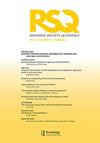What Is the Church? Defining Communal Commonplaces in the Pennsylvania State Statute of Limitations Debate
IF 1.1
2区 文学
Q3 COMMUNICATION
引用次数: 0
Abstract
ABSTRACT What exactly is the Church? Is it primarily an institution? Or is it the people in its pews? And depending on the answer, what obligations do the people who constitute it in the present have toward the past? This essay utilizes the Pennsylvania State Legislative debate over clergy sexual abuse in the Catholic Church as a way to explore how communal commonplaces are activated in public argument and used to shift the dominant meanings of a community. Communal commonplaces act as a shorthand to bring audiences to a place of shared understanding while managing opposing lines of argument, images, and tropes. Understanding the Church as a communal commonplace illuminates how divergent meanings can be activated for wildly different and materially consequential purposes. Analyzing the Church helps us to understand how other communal commonplaces— the nation, for instance—manage opposing images of a community.什么是教堂?宾夕法尼亚州诉讼时效辩论中公共场所的界定
本文章由计算机程序翻译,如有差异,请以英文原文为准。
求助全文
约1分钟内获得全文
求助全文

 求助内容:
求助内容: 应助结果提醒方式:
应助结果提醒方式:


